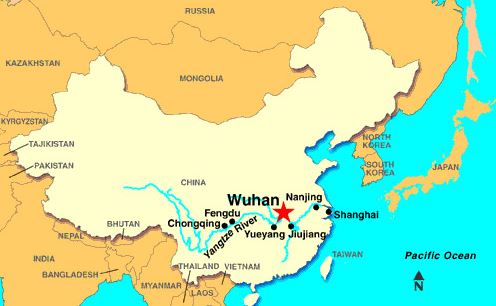
As the world was celebrating the advent of 2020 on New Year’s Eve, the first suspected cases of Wuhan pneumonia were also reported on the same day in the central Chinese city of Wuhan. A wholesale fish and live animal market in the city was shut down for alleged connection with the disease.
Wuhan did not get its global attention until the World Health Organization issued public statements and updates within a week after the outbreak. However, the media in Hong Kong, which is considered to be the only place to enjoy free press in PRC territory, and Chinese microblogs and social media have been following the development of the coronavirus since day one when the affected cases were reported to local health authorities.
All of a sudden, Wuhan has become as notoriously famous as Newtown, Connecticut, to tens of millions of Americans and other global citizens. We can’t forget the Sandy Hook Elementary School shooting in 2012 just as we can’t forget the battle against the worldwide epidemic SARS in 2003.
Western media is still skeptical about China’s handling of information about Wuhan pneumonia, after all, the jaded motto for Western media is “Where it bleeds, it leads.” But China has learned its hard lesson from covering up an epidemic as deadly as the SARS. Fear is the greatest epidemic in mankind. Covering-up information only leads to more mistrust and groundless “alternative facts.” (I give credit to President Trump’s top aide Kellyanne Conway for her catchphrase.) Misinformation and disinformation are big enemies to disease control efforts.
In the third week after the Wuhan pneumonia outbreak, Beijing had warned the Communist Party officials not to cover up the spread of Wuhan virus, saying anyone that withheld information would face severe punishment and be “nailed on the pillar of shame for eternity.” The official direction comes from a public social media account on WeChat called “cháng ān jiàn,” literally, “a sword from Chang’an.” It’s the social media outlet of China’s Central Political and Legal Affairs Commission. The account sheds lights on the internal perspective of the Politburo. As soon as the commentary is released on social media, it is highly quoted and shared online by Chinese media and netizens like a widespread antidote. Click here for the Chinese source.
To test the greenlight on WeChat, I reposted messages about the outbreak and made comments on my account and none were deleted. In fact, official news updates and commentaries by netizens about Wuhan pneumonia are prevalent on WeChat. The keyword “Wuhan” or “pneumonia” are not filtered by Chinese censors as yet.
Looking back at the information handling of the SARS, Chinese government officials did not inform the World Health Organization of the outbreak until February 2003, at least three months after the first cases were acknowledged locally. This time, it is around a week.
Internationally, the World Health Organization (WHO) has also learned its lesson from the SARS saga. Back then, an electronic warning system that is part of the WHO’s Global Outbreak Alert and Responsive Network failed to issue timely information and warning to the public, partly because the warning system was limited to English or French. Today, the warning system has been upgraded to enable Arabic, Chinese, English, French, Russian and Spanish translation. It is able to pick up reports of a disease outbreak, such as Wuhan pneumonia, in multiple languages and inform governments across the globe. Medical precaution and treatments save life, so are healthy and timely information mechanisms.
I pause when I read these headlines in the English media:
The Wuhan Pneumonia Crisis Highlights the Danger in China’s Opaque Way of Doing Things
China’s Response to Wuhan Virus Stokes Fears of SARS-like Cover-up
The Human Coronavirus Outbreak in Wuhan Reached Three Countries Outside China amid Worries of Official Cover-Ups
Disinformation is just as bad as misinformation. Misinformation is false or inaccurate information. Disinformation is false information which is intended to mislead.
Seventeen years ago, Chinese government misinformed the public about the SARS epidemic in the hope of diminishing public’s fear and saving face of the leadership. It backfired and caused more than eight thousand cases around the world.
Seventeen years later, just a look at these headlines, they are misleading. A reader who knows little about China per se can easily shape her or his view based on the writer’s skepticism. This is what is happening in our free press: the dramaticalistic coverage of a current event with subjective language is synonymous with disinformation. And the prevalence of social media makes disinformation convenience.
It is up to the reader to decide how to digest information. It is information transparency that will help us to determine the credibility of a news story. China is making amends to rescue the public trust at its own pace. We should give her time. Don’t jump to conclusion like the above headlines as yet.
Chinese media may never share the common value of the Western media because China is an authoritarian state. If the political system in mainland China changes to be like Taiwan’s multi-party system, the international community may be less critical of Chinese media censorship. And yet, while we cannot compare an apple with a pear, we can see some progress from yesterday’s SARS to today’s Wuhan pneumonia in terms of public information. We can see communication improvement of the WHO by adding several key languages in its electronic warning system. Comparison doesn’t have to be horizontal; we can see changes vertically as well.
Wuhan pneumonia brings Chinese people and the government together. I hope the disease outbreak will also do something good for inclusiveness and transparency between China and the international community. I pray that the Wuhan coronavirus will cease spreading and Wuhan as the virus origin will not be an Internet meme after the Chinese New Year of the Rat.
Do you want to leave a comment? Click here.
